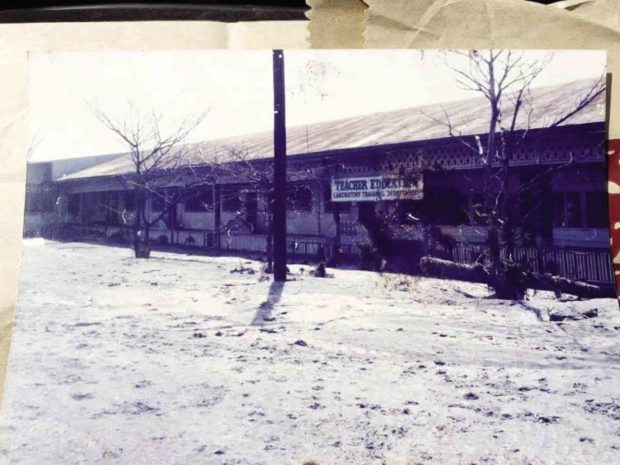Heritage school lives on despite Pinatubo eruption

This photo from the archives of Don Honorio Ventura Technological State University shows a building in its campus in Bacolor town in Pampanga province buried by volcanic debris.
BACOLOR, PAMPANGA—Whenever June comes around, Enrique Baking, president of Don Honorio Ventura Technological State University (DHVTSU) here, feels nostalgic and victorious.
The images 26 years ago of the university and the rest of this former Pampanga capital were of destruction.
After Mt. Pinatubo stirred to life and erupted on June 15, 1991, rains kept washing down volcanic debris from the slopes of Mt. Pinatubo, carrying ash, sand, mud, pumice stones, rocks and gases toward the Pasig-Potrero River that cuts through the town, and causing it to overflow and spread to villages.
The biggest lahar flows that buried Bacolor flowed as fast as stampeding horses on Oct. 1, 1995, when Typhoon “Mameng” hit Central Luzon.
As dawn broke, Baking realized that the oldest vocational school in Asia was no more. Its campus was buried under 10 to 15 meters of lahar, the roof of its old building jutting out in the eerie gray landscape.
Article continues after this advertisementViewed from the air, Bacolor was virtually erased from the map, with the half-buried San Guillermo Church and roofs left as grim reminders that this used to be the seat of culture and the arts in the province.
Article continues after this advertisementBaking and then president, Ernesto Nicdao, reflected on the fact that sustaining DHVTSU was a tall challenge and that putting it back on its feet was already a daunting task.
“The school was totally devastated,” Baking said.
In 1995, 100 teachers went back to work and reached out to 5,000 students by holding classes in makeshift classrooms in evacuation centers, resettlement sites and the campus where improvised rooms were connected by stilts made of bamboo and wood.
By 1996, then Chief Supt. Edgar Aglipay, Central Luzon police director and member of the regional development council, advised Nicdao to temporarily move the school out of harm’s way. But the government did not give the school any funds.
“I became a professional beggar,” said Baking, who, together with Nicdao, led the fundraising activities.
By the time Nicdao assumed as president in 2006, the late Sen. Juan Flavier, former President Gloria Macapagal-Arroyo and congressional leaders became staunch supporters. (Arroyo’s father, the late President Diosdado Macapagal, was able to get an education despite poverty through the support of Don Honorio Ventura).
At the same time, 50 to 60 percent of the school’s revenues went to rehabilitating the campus.
“The school survived on concerted efforts,” Baking said.
Now the campus has 15 new buildings and its students have reached more than 23,000, mostly from poor families. Except for the lahar-filled Gugu River behind it, the campus bears not even a slightest sign of the disaster that befell it.
It has opened extension campuses in Mexico, Sto. Tomas, Porac and Lubao towns that are subsidized by the local and provincial governments.
Arts and trade, called the “heritage courses,” remain strong. In 2014, the National Historical Commission of the Philippines reinstalled a 1959 marker that was buried by lahar.